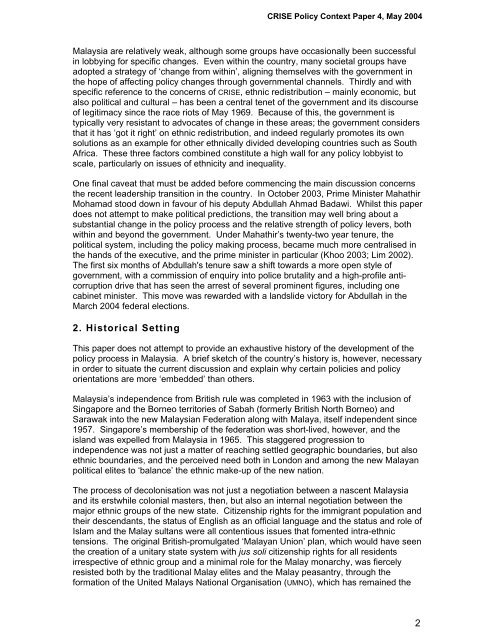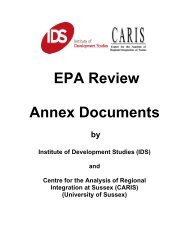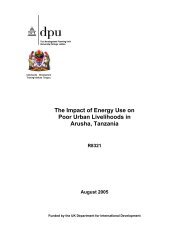Policy Levers in Malaysia - Department of International ...
Policy Levers in Malaysia - Department of International ...
Policy Levers in Malaysia - Department of International ...
You also want an ePaper? Increase the reach of your titles
YUMPU automatically turns print PDFs into web optimized ePapers that Google loves.
CRISE <strong>Policy</strong> Context Paper 4, May 2004<br />
<strong>Malaysia</strong> are relatively weak, although some groups have occasionally been successful<br />
<strong>in</strong> lobby<strong>in</strong>g for specific changes. Even with<strong>in</strong> the country, many societal groups have<br />
adopted a strategy <strong>of</strong> ‘change from with<strong>in</strong>’, align<strong>in</strong>g themselves with the government <strong>in</strong><br />
the hope <strong>of</strong> affect<strong>in</strong>g policy changes through governmental channels. Thirdly and with<br />
specific reference to the concerns <strong>of</strong> CRISE, ethnic redistribution – ma<strong>in</strong>ly economic, but<br />
also political and cultural – has been a central tenet <strong>of</strong> the government and its discourse<br />
<strong>of</strong> legitimacy s<strong>in</strong>ce the race riots <strong>of</strong> May 1969. Because <strong>of</strong> this, the government is<br />
typically very resistant to advocates <strong>of</strong> change <strong>in</strong> these areas; the government considers<br />
that it has ‘got it right’ on ethnic redistribution, and <strong>in</strong>deed regularly promotes its own<br />
solutions as an example for other ethnically divided develop<strong>in</strong>g countries such as South<br />
Africa. These three factors comb<strong>in</strong>ed constitute a high wall for any policy lobbyist to<br />
scale, particularly on issues <strong>of</strong> ethnicity and <strong>in</strong>equality.<br />
One f<strong>in</strong>al caveat that must be added before commenc<strong>in</strong>g the ma<strong>in</strong> discussion concerns<br />
the recent leadership transition <strong>in</strong> the country. In October 2003, Prime M<strong>in</strong>ister Mahathir<br />
Mohamad stood down <strong>in</strong> favour <strong>of</strong> his deputy Abdullah Ahmad Badawi. Whilst this paper<br />
does not attempt to make political predictions, the transition may well br<strong>in</strong>g about a<br />
substantial change <strong>in</strong> the policy process and the relative strength <strong>of</strong> policy levers, both<br />
with<strong>in</strong> and beyond the government. Under Mahathir’s twenty-two year tenure, the<br />
political system, <strong>in</strong>clud<strong>in</strong>g the policy mak<strong>in</strong>g process, became much more centralised <strong>in</strong><br />
the hands <strong>of</strong> the executive, and the prime m<strong>in</strong>ister <strong>in</strong> particular (Khoo 2003; Lim 2002).<br />
The first six months <strong>of</strong> Abdullah's tenure saw a shift towards a more open style <strong>of</strong><br />
government, with a commission <strong>of</strong> enquiry <strong>in</strong>to police brutality and a high-pr<strong>of</strong>ile anticorruption<br />
drive that has seen the arrest <strong>of</strong> several prom<strong>in</strong>ent figures, <strong>in</strong>clud<strong>in</strong>g one<br />
cab<strong>in</strong>et m<strong>in</strong>ister. This move was rewarded with a landslide victory for Abdullah <strong>in</strong> the<br />
March 2004 federal elections.<br />
2. Historical Sett<strong>in</strong>g<br />
This paper does not attempt to provide an exhaustive history <strong>of</strong> the development <strong>of</strong> the<br />
policy process <strong>in</strong> <strong>Malaysia</strong>. A brief sketch <strong>of</strong> the country’s history is, however, necessary<br />
<strong>in</strong> order to situate the current discussion and expla<strong>in</strong> why certa<strong>in</strong> policies and policy<br />
orientations are more ‘embedded’ than others.<br />
<strong>Malaysia</strong>’s <strong>in</strong>dependence from British rule was completed <strong>in</strong> 1963 with the <strong>in</strong>clusion <strong>of</strong><br />
S<strong>in</strong>gapore and the Borneo territories <strong>of</strong> Sabah (formerly British North Borneo) and<br />
Sarawak <strong>in</strong>to the new <strong>Malaysia</strong>n Federation along with Malaya, itself <strong>in</strong>dependent s<strong>in</strong>ce<br />
1957. S<strong>in</strong>gapore’s membership <strong>of</strong> the federation was short-lived, however, and the<br />
island was expelled from <strong>Malaysia</strong> <strong>in</strong> 1965. This staggered progression to<br />
<strong>in</strong>dependence was not just a matter <strong>of</strong> reach<strong>in</strong>g settled geographic boundaries, but also<br />
ethnic boundaries, and the perceived need both <strong>in</strong> London and among the new Malayan<br />
political elites to ‘balance’ the ethnic make-up <strong>of</strong> the new nation.<br />
The process <strong>of</strong> decolonisation was not just a negotiation between a nascent <strong>Malaysia</strong><br />
and its erstwhile colonial masters, then, but also an <strong>in</strong>ternal negotiation between the<br />
major ethnic groups <strong>of</strong> the new state. Citizenship rights for the immigrant population and<br />
their descendants, the status <strong>of</strong> English as an <strong>of</strong>ficial language and the status and role <strong>of</strong><br />
Islam and the Malay sultans were all contentious issues that fomented <strong>in</strong>tra-ethnic<br />
tensions. The orig<strong>in</strong>al British-promulgated ‘Malayan Union’ plan, which would have seen<br />
the creation <strong>of</strong> a unitary state system with jus soli citizenship rights for all residents<br />
irrespective <strong>of</strong> ethnic group and a m<strong>in</strong>imal role for the Malay monarchy, was fiercely<br />
resisted both by the traditional Malay elites and the Malay peasantry, through the<br />
formation <strong>of</strong> the United Malays National Organisation (UMNO), which has rema<strong>in</strong>ed the<br />
2
















